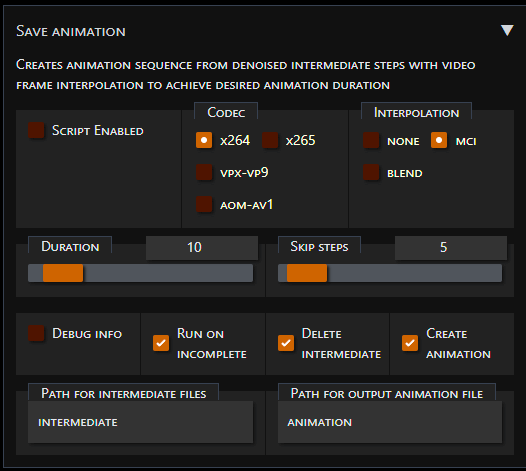Extension to create animation sequence from denoised intermediate steps
Registers a script in txt2img and img2img tabs
Creating animation has minimum impact on overall performance as it does not require separate runs
except adding overhead of saving each intermediate step as image plus few seconds to actually create movie file
Supports color and motion interpolation to achieve animation of desired duration from any number of interim steps
Resulting movie fiels are typically very small (~1MB being average) due to optimized codec settings
mci-girl-in-a-city-beauty.mp4
- By default, previews are generated in quarter resolution
For full resolution setSettings->Live previews->Image creation progress preview mode->Full - Some built-in samplers are not supported as they do not trigger a callback
For example,DDIMandPLMS - Use sampler that creates variations to make more interesting animations
Good example isEuler A ffmpegmust be installed present in system path- Batch size and count must be set to 1 to use single seed value during entire animation
- Metadata details are stored in title / description / artist sections of a generated movie file
- Good rule-of-thumb is 1 sec animation duration for each 10 steps
That means that real FPS is 10 while interpolation raises it to 30 - Note: Default max step size in
automatic1111is 100,
you may want to increase it to 200 inui-config.jsonfor longer animations when using some samplers
- Duration: Target duration of animation in seconds
When interpolation is enabled, target duration is approximate - Media Codec: Media codec to use when creating animation
- Interpolation method: Used when creating extra frames to archieve duration
- None: Simply extends duration each image to match desired duration
- MCI: Motion compensated interpolation
- Blend: Color blend interpolation
- Skip initial steps: Allows to skip n initial steps when creating animation as they may be overly noisy
- Print debug info: Prints verbose information on console
- Run on incomplete data: If run was interrupted, should animation creation still run on partial results
Note: This also happens when using some samplers (e.g. DPM adaptive)
as they perform early-exit when complete regardless of desired step value - Delete intermediate files: Delete all generated intermediate (per-step) images after run
If not, new files will be appended so you can single animation of multiple generative runs - Create output animation file: Runs
ffmpegto create animation from intermediate files
Disable if you want to use intermediate files manually - Path for intermediate files: Relative to save location
- Path for output animation file: Relative to save location
Dependent on your system and settings used to produce images
Type of interpolation used has direct impact on performance: None and Blend results in almost instant animation creation while MCI takes twice as long as its a two-pass interpolation method
Example: Using Euler A sampler with 100 steps to produce a 10 sec blend animation of a single trained embedding with 30 frames-per-second takes just ~1 min on nVidia RTX3060
Uses ffmpeg minterpolate filter
Compare resulting size & time to create 30sec blend animation from 100 frames:
| codec | size | time |
|---|---|---|
| h264 | 1100 KB | 5.3 s |
| h265 | 350 KB | 6.0 s |
| vp9 | 700 KB | 6.6 s |
| av1 | 850 KB | 7.8 s |
Default parameters used for each codec:
- h264:
-vcodec libx264 -preset medium -crf 23 - h265:
-vcodec libx265 -preset faster -crf 28 - vpx-vp9:
-vcodec libvpx-vp9 -crf 34 -b:v 0 -deadline realtime -cpu-used 4 - aom-av1:
-vcodec libaom-av1 -crf 28 -b:v 0 -usage realtime -cpu-used 8 -pix_fmt yuv444p - prores:
-vcodec prores_ks -profile:v 3 -vendor apl0 -bits_per_mb 8000 -pix_fmt yuv422p10le
